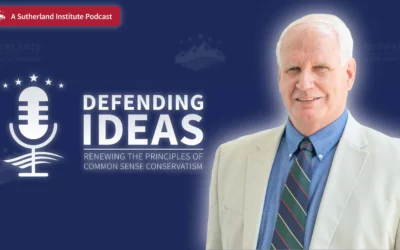
Written by William C. Duncan
November 2, 2023

In a recent post, I noted some signs that lower federal courts are adopting the protective approach toward religious freedom that has characterized the U.S. Supreme Court’s recent cases.
Some recent decisions from Maryland and New Jersey suggest that this may also be happening in state courts. Importantly, these are blue states, underscoring the reality that religious freedom need not be a partisan issue.
Maryland
The Maryland case, Doe v. Catholic Relief Services, actually arose with a request from a federal court for the Maryland Supreme Court to clarify the requirements of the state’s anti-discrimination law. The underlying case involved a Catholic social services provider, Catholic Relief Services (CRS), that “follows the Catholic teaching that marriage is between one man and one woman and ordered to the procreation of children.” An employee of the organization sought spousal benefits for his same-sex spouse, which were mistakenly granted but later withdrawn “because [CRS] considers the provision of such benefits to be contrary to its Catholic values.”
The employee sued, alleging he had been discriminated against because of sex (because his spouse’s sex is male). This is important because the Maryland anti-discrimination law also includes sexual orientation as a protected category but specifically exempts religious employers “with respect to the employment of individuals of a particular religion, sexual orientation, or gender identity to perform work connected with the activities of the religious entity.” The federal district court did not feel it could properly interpret the state law questions raised by the case and so certified a question to the Maryland Supreme Court about what Maryland law requires.
The Maryland Supreme Court held that since both sex and sexual orientation are included separately in the statute, the latter could not be a subset of the former. Thus, if the work the employee does is connected to CRS’s religious mission, he is precluded from making the claim of sexual orientation discrimination under the statute’s exemption for religious organizations.
New Jersey
The New Jersey case, Crisitello v. St. Theresa School, involved an employee who provided child care and taught art at a school operated by the Church of St. Theresa. As a condition of employment, the teacher had signed a Code of Ethics, which required employees to live consistent with the teachings of the Catholic Church. In the process of talking about a change in some of the teacher’s assignments, the school principal became aware the teacher was pregnant. Since the teacher was not married, she had not complied with her contractual obligation. She was asked to resign.
New Jersey’s employment anti-discrimination law prohibits discrimination on the basis of, among other things, the categories of pregnancy and marital status. The teacher sued the school, arguing that she had been discriminated against based on both these classifications.
The trial court ruled in favor of the school, pointing to a provision in the state’s anti-discrimination statute allowing “a religious entity to follow the tenets of its faith” in making employment decisions. That court also pointed to “significant evidence in the record that St. Theresa’s supports its married teachers who become pregnant and that another Catholic school, also within the Archdiocese of Newark, fired an unmarried male teacher after he revealed that his girlfriend was pregnant with their child.”
Though the court of appeals disagreed, the New Jersey Supreme Court came to the same conclusion as the trial court. The supreme court simply noted that because the school was following its religious beliefs, it was protected by the anti-discrimination law.
Conclusion
The protection of religious employers seeking to do their work without abandoning faith commitments in these cases is a heartening development. It also demonstrates that religious freedom protections and protections from discrimination can coexist. Sutherland Institute has argued that with appropriate legislative balancing, both of these values can be respected, and these cases provide additional evidence for that proposition.
This is not to say that all difficulties can be avoided. The employees in these cases would remind us of this reality. The blunt instrument of litigation, though, typically makes the situation more difficult. Threatening to impose mandates on religious employers that conflict with their religious commitments makes it difficult for them to provide the beneficial services they feel called to give without abandoning their religious character. Affirmatively working to preclude the need for litigation allows these contributions to be made. By extension, pursuing legislative solutions allows all of society to experience the attendant benefits, while still providing protections from discrimination where doing so does not interfere with religious freedom.
That solution will not necessarily satisfy everyone, but it is a good way of trying to ensure equality under the law and fundamental fairness in a pluralistic society.

Insights: analysis, research, and informed commentary from Sutherland experts. For elected officials and public policy professionals.

- Recent decisions in Maryland and New Jersey demonstrate a concern for protecting the freedom of religious employers to operate consistent with their faith-based missions.
- These decisions both held that religious exemptions in state anti-discrimination laws do not prevent religious organizations from upholding mission-based requirements in their work.
- The cases also demonstrate that laws can be drafted to protect against discrimination without also limiting religious freedom.
Read More
Protecting property rights against government overreach
While governments can continue to regulate land use, these regulations and fees must be justified by a government interest and proportional to the effect of the development’s impact on that interest.
Do we need to care about the Utah State Board of Education?
For any Utah voters who also feel like K-12 public education is headed in the wrong direction, learning about the candidates running for a seat on the Utah State Board of Education (USBE) is a wise choice this election season.
Defending education choice the right way
Education choice has exploded in popularity across the nation in recent years. So why does it remain a contentious point of debate in some parts of the country?


